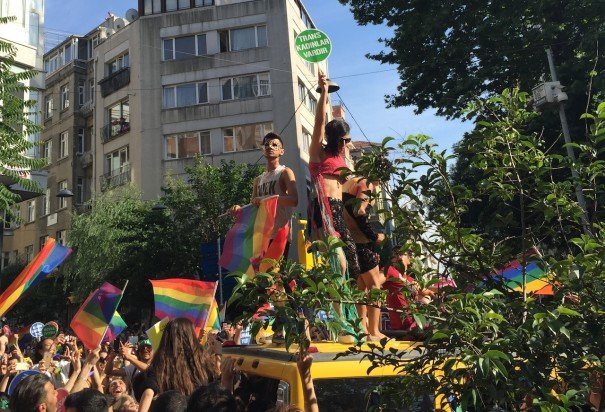
A Gay Pride March During Ramadan in Erdogan’s Istanbul

A Gay Pride March During Ramadan in Erdogan’s Istanbul
Grape Vinegar on Istiklal
We sought refuge from the Turkish police in a perfume shop on Istiklal. The staff at Yves Rocher was gracious enough to let us in so that we could recover from the sting of tear gas. A handful of us entered, pushed off Istanbul’s elegant high street by riot police who met Sunday’s 13th annual gay pride parade with tear gas, rubber bullets, and white vans outfitted with what looked like water cannons on top. People kept coughing, nervously checking phones and documenting the siege through the glass walls of the perfume shop. The vials of expensive perfumes in pinks, greens, and golds stood artfully on the store’s shelves, untouched from the chaos outside. The shopkeeper distributed cotton pads dipped in grape vinegar. It will help with the burn, he said.
It’s hard to know where the crackdown came from specifically. Istanbul pride doesn’t usually fall during the month of Ramadan, a month-long observation of fasting, prayer and abstinence. Dancing, loud music, unbridled sexuality on display—the characteristics of any good pride parade—could offend the sensitivities of Istanbul’s observant Muslims, the government suggested. But was that it, or was it just President Erdogan and his ruling AK Party flexing their muscle on the street, as they do nearly any time a non-AKP group wants to march?
Whatever the reason, the authorities had banned the parade at the last minute. But organizers of the march urged their allies to “remain in place” and “make some noise with pots and pans or whatever you find, wherever you are.” For 13 years, Istanbul has been hosting the largest gay pride parade in the Muslim world. Marchers felt they were abiding by their nation’s constitution, and the last minute ban wasn’t much of a deterrent: reports pegged the attendance at about 100,000.
I marched in the Istanbul Pride Parade to show solidarity with the LGBT community in my city, just as I did growing up in Chicago. The pride parades I was used to featured gargantuan floats sponsored by corporations and swag galore: Mardi Gras beads, T-shirts, buttons, stickers. My boyfriend and I expected much the same here. Istanbul is a city renowned for balancing tradition and modernity—what better place to see it in full display than the annual Pride Parade? Being Indian, Muslim, and American, Istanbul felt like the perfect place to reconcile my various identities, a city that weighed its liberal self against its culture and history.
My parents are somewhat conservative Muslims who immigrated to Chicago when I was eight. My father was a cab driver who’d rail against pride paraders blocking traffic, being flamboyant, creating a scene. I imagine a lot of conservative Muslims in Istanbul share his stance: the idea that at least during the month of Ramadan, being “out and proud” should be on hold. I forged a distinct identity, however, and my politics were liberal as hell. I debated young conservatives on same-sex marriage and abortion. I wasn’t afraid to take on my father, either. I was no stranger to the culture wars in America. And I came to Istanbul with a “bring-it-on” attitude. The social fissures of this place were bound to come to the fore at the parade. I had to be there.
I spoke to a high school student right before things started to get ugly. She was marching for the first time because her sister identifies as lesbian, and she said that being out in Turkey was a “little different because we’re Muslim.” Armin, who called himself a “refugee from Tehran,” said he was glad to be at Istanbul’s Pride Parade for the first time because it was forbidden in Iran, saying, “people are free here.” But Yula, a veteran who’s been coming to the parade for 13 years, called the day “more of a strike … only to say we’re here.”
We left Yves Rocher, only to return when tear gas filled the streets again. On Istiklal, tourists continued to snap away, documenting police control, the color and cries of young boys and girls, lovers across the spectrum. A girl blew bubbles by a police van. Syrian refugees continued to beg. Musicians played the oud and their goblet drums. Families bought baklava and ice cream. The azaan, the call to prayer, filled the street and its haunting beauty, and we had grape vinegar to soothe us.